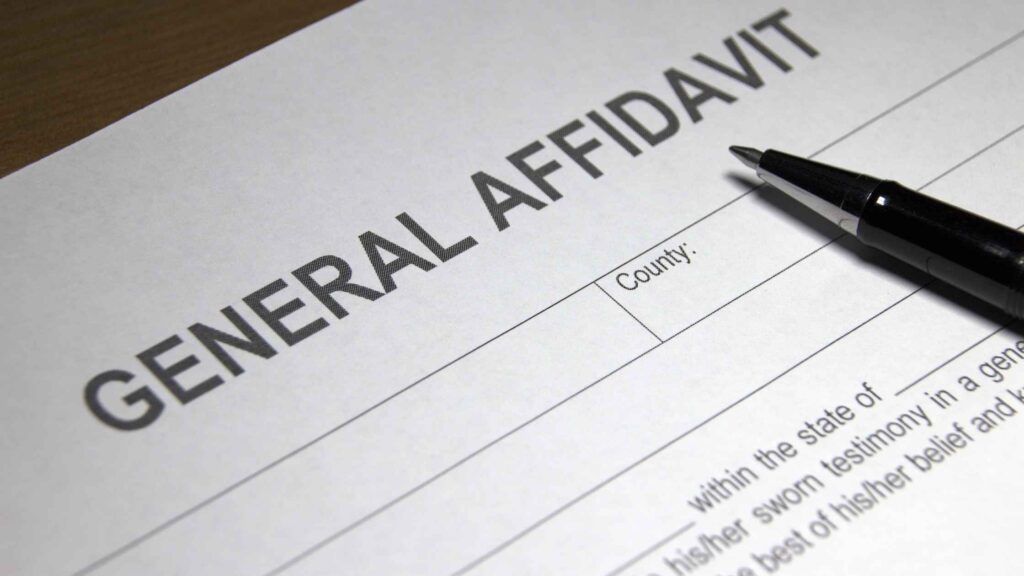You are going to buy a home in the United States, and it’s truly an important milestone for you. It’s a key way to build generational wealth. But the important real estate documents need to be signed and notarized, and you are wondering, can a regular notary notarize real estate documents? Yes, a regular notary can notarize real estate documents and can guide you to complete your purchasing process.
In this blog, we’ll go through everything you need to know about the notarization of real estate documents. So, let’s get started.
What Real Estate Documents Require Notarization?
There are almost 13 common types of real estate documents that require notarization. Here, I’m giving you the list and will explain each of the documents further in the later part.
- Deed
- Mortgage or Security Instrument
- Affidavit of Owner Occupancy
- Seller’s Affidavit
- Borrower Affidavit
- Name Affidavit
- Signature Affidavit
- Error & Omissions / Compliance Agreement
- Document Correction Agreement / Limited Power of Attorney
- Purchase Agreement
- Lease Agreement
- Liens & Releases
- Various Affidavits
Deed
A deed is considered one of the most important real estate documents that need notarization from a notary. This document establishes the history of ownership. The deed mainly indicates the transfer of property and includes information like interest, rights, and title from the seller or grantor through sale or another form of conveyance to the buyer. The property buyer is also known as the grantee.
Though the form and language of this document can differ from state to state, it should be filed in the public land records office of the property’s governing jurisdiction. Once a deed is made public, it’ll be easy to verify that you obtained ownership of the property properly. Notarization first verifies the parties involved and then ensures the integrity of the transfer. This process protects you from any fraudulent conveyance.
Mortgage or Security Instrument
For lenders and borrowers, notarization of the document adds an extra layer of security. This document contains the legal description of the property, purchase price, interest rate, and repayment period. Notarization of this document ensures that both parties involved understand the terms and implications of the loan. If the borrower fails to meet the terms, the lender will have the right to the property and can foreclose on it. That’s why this document must be signed, notarized, and put in public records, the same as the deed.
Affidavit of Owner Occupancy
In this document, a borrower will sign an affidavit and certify that they will occupy the property as their primary residence. But what does this mean? It indicates that the borrower, after occupying the property, cannot lend or lease it to others as it is already considered their primary residence.
If the borrower rents it out instead, this will change the terms of the loan because lenders typically offer better rates for primary residences since they are seen as lower-risk investments.

If the property is rented, the risk of default is generally higher. To account for this, lenders may increase the interest rate or adjust the loan terms if the property is used as a rental.
Seller’s Affidavit
A Seller’s Affidavit is a legal document. In this document, the seller of a property declares certain facts about the property, such as ownership status, the absence of any liens or encumbrances, or that there are no undisclosed issues or claims affecting the property (e.g., unpaid taxes, disputes).
A seller’s affidavit ensures that the seller has provided accurate information, verifies the ownership of the seller, helps prevent legal disputes, and helps the buyer receive a clean title insurance policy.
Notarization minimizes the risk of fraud or misrepresentation, as it legally binds the seller to the statements in the affidavit. This generally protects both the buyer and the lender in the transaction.
Borrower Affidavit
This is a legal document in which the borrower attests to certain facts related to the mortgage loan or property purchase.
Notarizing a borrower affidavit is essential. Why? Because this document provides legal verification of the borrower’s identity and intent. This ensures that the affidavit’s contents are authentic and signed willingly.
Notarization protects both the lender and the borrower from potential disputes or fraud because notarizing a borrower affidavit legally binds the borrower to their statements and reduces risks associated with inaccurate information or misrepresentation.
Name Affidavit
If you use another name besides your real name on different accounts and important documents, you need to sign this affidavit. You need to disclose it and have it notarized in the document.
Signature Affidavit
A person can use a different version of their signature. This can be a different version of their name and maiden name. If you use different versions of your signatures on different documents, then you need to notarize all the variants of the signature from a notary public.
Error & Omissions / Compliance Agreement
A Compliance Agreement is a document signed by the borrower during the mortgage process, agreeing to cooperate with the lender to correct any typographical, clerical, or administrative errors found in the loan documents after closing. This could include fixing typos, missing signatures, or minor discrepancies that don’t change the terms of the loan. Notarizing the Compliance Agreement provides legal verification of the borrower’s identity and confirms that they signed the document willingly.
Document Correction Agreement / Limited Power of Attorney
A Document Correction Agreement (often combined with a Limited Power of Attorney) is a legal document. In this agreement, the borrower authorizes the lender or its agents to make minor corrections to the loan documents on their behalf if any clerical errors, such as typos or administrative mistakes, are found after closing. The Limited Power of Attorney grants the lender limited legal authority to act on behalf of the borrower solely for the purpose of correcting these minor mistakes.
Purchase Agreement
A Purchase Agreement is a legally binding contract between a buyer and a seller. This document mainly outlines the terms and conditions of a property sale. Generally, a purchase agreement does not require notarization to be legally valid, but certain parties may choose to notarize the document for extra security.

Lease Agreement
A Lease Agreement is a legally binding contract between a landlord (property owner) and a tenant (individual or business) that outlines the terms and conditions under which the tenant rents the property. A typical lease agreement typically contains information like the length of the lease, rent, security deposit, maintenance and repairs, rules and restrictions, and other policies. This document details each party’s rights, responsibilities, and obligations during the lease period. Notarizing this document is recommended for leases longer than one year, but it’s not mandatory.
Liens & Releases
A lien is a legal claim or right against a property that allows a lender or creditor to take possession of the property if the owner fails to meet their obligations, such as repaying a loan or fulfilling a contract. A lien doesn’t need to be notarized in most states except for Mississippi and Wyoming.
Various Affidavits
During a property transaction, several affidavits may be required to verify key information. These notarized statements ensure that all disclosures are accurate and protect all parties involved. Depending on your situation, you may be required to sign some or all of the following affidavits:
- Marital Status Affidavit
- Refinance Affidavit
- Property Survey Affidavit
- Homestead Affidavit
- Debts and Liens Affidavit
Why Real Estate Documents Need Notarization
Notaries are trained professionals working on behalf of the states. Their main goal is to prevent fraud and forgery within important transactions. In real estate documents, a notary verifies the identities of the individuals and ensures the signatures of the parties are genuine.
Notarized documents are considered more credible than non-notarized documents. The seal and signature of a notary on real estate documents ensure they have been executed properly and in accordance with the law.
Many real estate documents, such as deeds and affidavits, must be notarized to ensure the proper transfer of title, and many states in the US mandate notarization for specific real estate documents.
Notarization is an essential step in real estate transactions. This process enhances the credibility and enforceability of documents. The main goal of notarization is to protect the parties from fraudulent activities.
The Role of a Notary
Generally, notaries are public officials commissioned by their state’s governor to act as impartial witnesses to transactions. Notaries typically verify a signer’s identity, administer oaths, take acknowledgment of legal documents, and perform other certification duties according to the laws of the state in which the notary resides.
Critical loan documents (also known as recording instruments) are signed and notarized at the time of real estate closing. These are generally recorded in the land record system. To ensure validity, a notary stamp is required on some of these documents before recording.
Sometimes, criminals attempt to steal real property by creating fake documents and registering them. To do this, they enlist the help of unscrupulous notaries or forge notary seals to deceive the recording jurisdiction and carry out these illegal activities. For this reason, the notarization process is very helpful in preventing fraud, business identity theft, and other crimes.
The recording jurisdiction doesn’t take necessary steps to verify the credibility of a real estate document, but other requirements must be met to avoid rejection. In any real estate transaction, a notary must execute the real estate documents and guarantee the new owner’s property rights. Otherwise, any misstep can lead to legal troubles.
Who Can Notarize Real Estate Documents?
Every state in the US establishes rules for real estate transactions. During the notarization process of real estate documents, some states require the presence of an attorney, restrict the notary fee amount, and may require additional licenses. States can also limit the parties who can handle loan products.
As a result, the process at closing may differ according to the property’s location. That’s why a buyer and a seller may work with the following professionals:
Title Agent: A title agent is responsible for verifying the legal ownership of the property and ensuring that the title is clear of any claims, liens, or other encumbrances. They conduct a title search to confirm the seller has the legal right to transfer the property. Once confirmed, they issue a title insurance policy to protect the buyer and lender (if applicable) against potential claims or defects in the title.
Closing Agent: The closing agent (escrow officer) coordinates the closing process, which involves preparing and organizing all necessary documents, overseeing the transfer of funds, and ensuring that all parties (buyer, seller, lender) complete their obligations. They handle the signing of final documents, disburse funds according to the agreement, and record the transaction with the appropriate government office to finalize the transfer of ownership.
Real Estate Attorneys: A real estate attorney is a lawyer who specializes in property law and handles legal matters related to real estate transactions. Some states (Connecticut, Delaware, Georgia, Kentucky, Massachusetts, New Hampshire, North Carolina, South Carolina, West Virginia) require the presence of a real estate attorney during the closing of real property.

Notary Signing Agents/Loan Signing Agents: A notary signing agent works as an impartial witness authorized by law to authenticate and certify the signing of real estate documents. These agents are commonly known as notary signing agents rather than “real estate notaries.” To perform these duties, a notary signing agent typically undergoes an annual background check, passes the Signing Professionals Workgroup (SPW) exam, and maintains Errors & Omissions (E&O) insurance to protect against errors.
What Happens if a Real Estate Document Isn’t Executed or Notarized Correctly?
Signing and notarizing real estate documents help to establish ownership and lien rights to a property, but if a real estate document isn’t executed or notarized correctly, what could happen? Here’s what might occur:
Invalid Document: An improperly executed or notarized document might not hold up in court, potentially invalidating the entire transaction. This could mean a deed isn’t legally transferred, affecting ownership rights.
Title Complications: Title insurers may refuse to insure the property if documents are incorrect, leading to delays in the sale or transfer and impacting the property’s marketability.
Loan Issues: Lenders often require notarized documents to secure their interest in the property. If the loan documents aren’t properly executed, the lender may be unable to enforce the mortgage or initiate foreclosure, posing financial risks to both the borrower and lender.
Potential Legal Disputes: Errors in execution or notarization can lead to legal disputes over ownership, boundaries, or other rights associated with the property. This may require court intervention, increasing costs and delaying resolution.
Fraud Risks: If not properly notarized, there’s a higher risk of forgery or fraud. For example, someone could attempt to falsify a document without a proper witness, potentially leading to serious legal repercussions.
Transaction Delays or Cancellations: Both buyers and sellers might face significant delays or even a complete cancellation of the transaction until issues are resolved.
FAQs
Can a Regular Notary Notarize Real Estate Documents?
Yes, a regular notary can notarize real estate documents as long as they are authorized to perform notarial acts in their state. However, it’s essential that they understand the specific requirements for real estate transactions, which can vary by jurisdiction.
Why Do Real Estate Documents Need Notarization?
Real estate documents need notarization to verify the identities of the signers and ensure that they are signing willingly and without coercion. This adds a layer of legal protection and helps prevent fraud, making the documents more credible in legal contexts.
How Long Does It Take To Sign Real Estate Documents?
The time it takes to sign real estate documents can vary, but typically it ranges from 30 minutes to an hour. This includes reviewing the documents, signing them, and completing any necessary notarization. However, additional time may be needed if there are questions or concerns about the terms.


